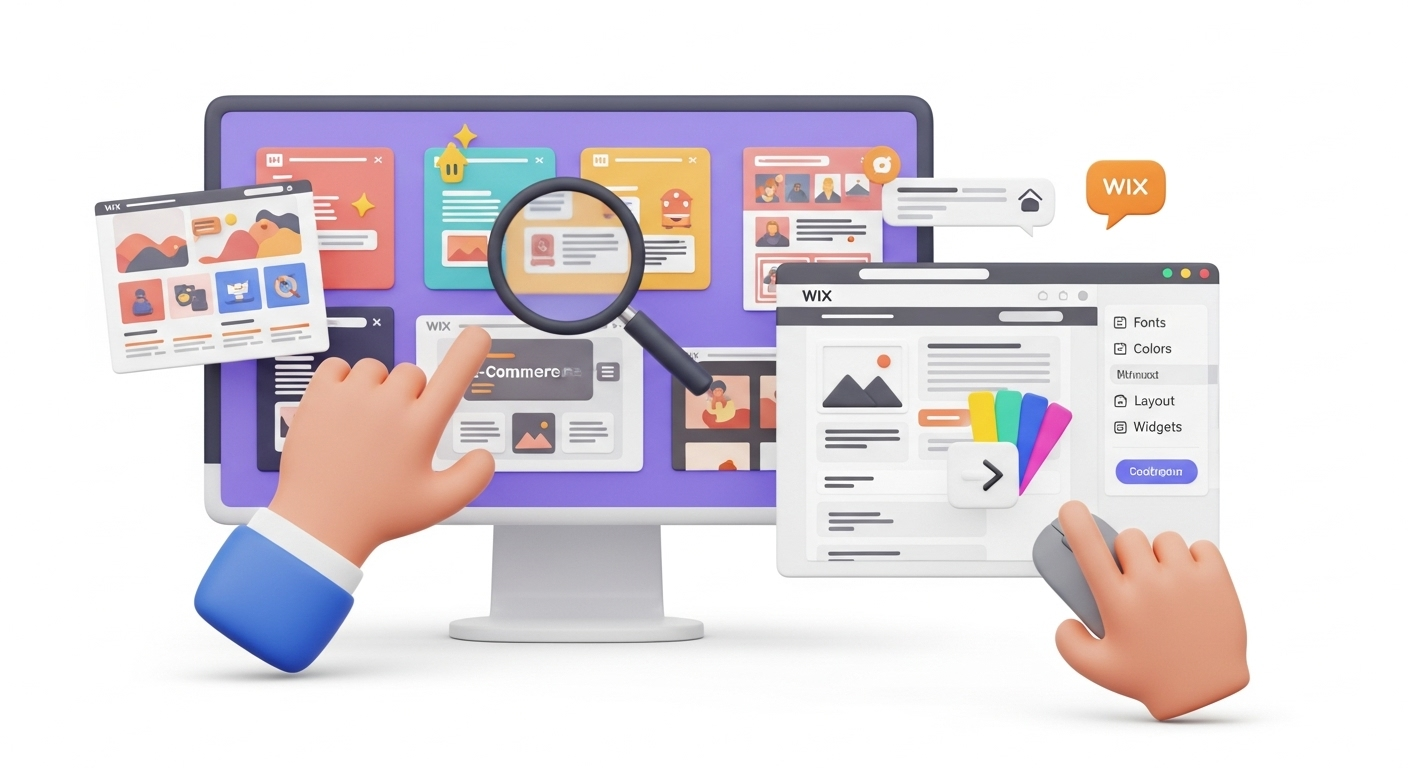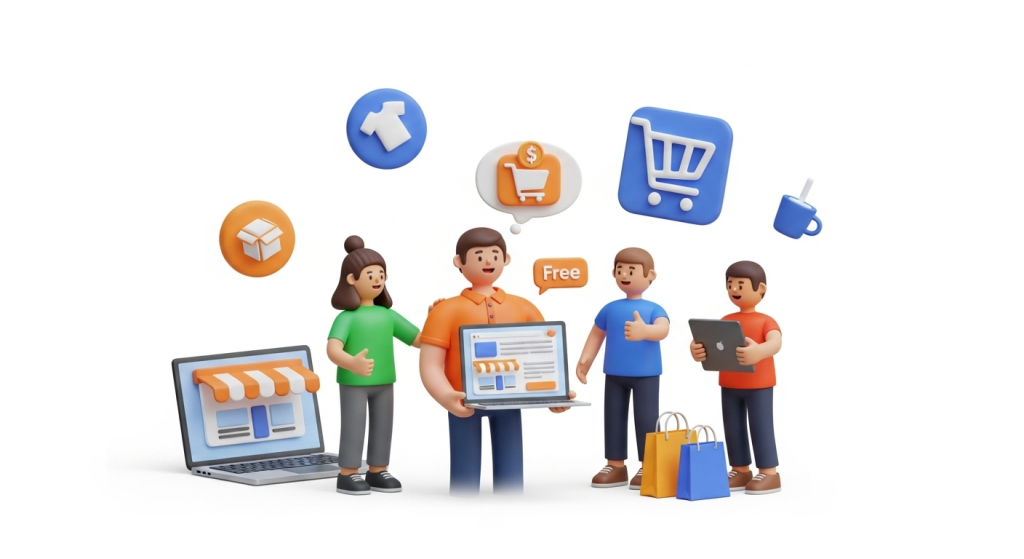So, you've decided to start an online business, or, probably, your current platform no longer meets the growing eCommerce market demands. Either way, you came here looking for an answer - how to choose the best eCommerce platform in 2026 to settle your store on. Thus, today we'll explore a multi-functional solution's main features and provide you with the best examples among the popular shopping carts. Read on to find out more!
Questions to Ask When Choosing the Best eCommerce Platform
The variety of eCommerce platforms is striking these days, and it takes a lot to choose the perfect one. Unfortunately, there's no all-in-one solution that would suit every online merchant. However, let's try to single out the main features you should be looking for when choosing a shopping cart to find your perfect one.
What level of user-friendliness is good for me?
Ease of use is the first thing you need to consider when deciding on a future home for your business. There are platforms of different complexity. Some require excellent coding skills and can be too hard to handle for an average store owner. Others, contrarily, are very intuitive and straightforward. So, we advise you to think about your tech competence level before making the final decision.
Will the platform's security level influence my business?
Store safety is another crucial aspect that should not be overlooked. Your future customers need to be sure that their personal data is secure and will not be disclosed. Therefore, you need to confirm that your platform supports the SSL certificate implementation. It must also operate with the leading PCI-DSS compliant payment solutions (e.g., PayPal, Stripe, Apple Pay, Square, etc.). Additionally, consider the possibility of adding advanced verification methods (like Google Captcha) and creating robust website policies.
What about the customization and scalability rates?
eCommerce is all about growth. The market conditions are continually changing, and so should your store. It would be best if you were ready to adapt it to meet the new requirements. Thus, the future platform must possess a high level of customization and scalability. It is always easier and more cost-effective to modify the existing software than install the new one. We recommend looking for a feature-rich solution tailored to support the business expansion in the years to come. The more high-quality plugins the platform offers - the better. They will help you build a store that works for the business and enables you to sell products effectively.
Is SEO support essential for the store's popularity?
Every online business owner strives to take up the top positions in the search results ranking. Consequently, the eCommerce solution should offer some of the basic SEO-friendly features: custom domain name creation, blogging features, ability to collect customer reviews, use meta titles and meta descriptions, canonical tags, SEO-friendly URLs, API integration, etc.
Does my store need to be mobile-friendly?
Nowadays, the majority of shoppers surf the net using mobile devices. Hence, your website must be mobile-friendly. Otherwise, you might lose potential clients. So, get the platform with a mobile-responsive theme or template that allows trouble-free access to your store. The improvement of the customer journey will eventually lead to a sales increase.
Is multiple-channel integration important?
If you're planning to grow your business, integration with other systems and channels can be your golden ticket. Selling online goes way beyond using a single platform. Therefore, make sure that your shopping cart integrates with Facebook, Instagram, etc., and offers all the necessary plugins and extensions. Synchronizing all your seller accounts on multiple marketplaces with your online store can also help in business management.
How much am I ready to spend per month/year?
The last but not least factor that will influence your choice is the platform's price. Modern eCommerce solutions provide different options - some come with monthly fees, others are free but require additional expenses (e.g., hosting, domain, themes, plugins, etc.). First off, you need to decide how much you are willing to pay for a service and what options it should include. Also, consider your budget and weigh all the pros and cons of a particular platform.
How to Choose the Best eCommerce Platform: the Variety of Options
Now, when you know what main features the eCommerce platform should include, let's explore the most popular options available for online merchants.
WooCommerce
Being the market leader, WooCommerce is believed to be the best plugin for WordPress. It offers users unlimited customization possibilities, basic SEO features, countless themes and extensions that turn the store management process into a pleasurable experience.
This multi-functional open-source solution is free to download and use. Though, get ready to spend extra money on a web host, domain, necessary add-ons, etc. The installation process is simple and requires no special skills. The admin panel is also straightforward, and adding products is easy.
WooCommerce integrates with numerous third-party plugins and extensions. Therefore, you should not have problems with picking the necessary ones. The solution supports over 100 payment gateways, including PayPal and Stripe.
When it comes to customer support, the company doesn't provide any direct help. However, the web's full of useful guides, blog posts, and forums where you can find answers to all your questions.
WooCommerce brief outline:
Pros:
- highly flexible and customizable,
- numerous free and paid designs/extensions,
- active community of experts.
Cons:
- self-hosted,
- requires WordPress proficiency,
- lacks official support.
Price:
- Freemium model
WooCommerce is suitable for:
- both large and small businesses
Magento
If you possess professional web development experience, the Magento platform is definitely your go-to destination. Due to its open-source nature, the solution has the most extensive feature set and customizability options currently available on the market. However, it was not made for beginners and has a steep learning curve.
The tool's high flexibility makes it possible to scale the software and change it along with your business. Magento's out-of-the-box features include powerful marketing tools, easy content management, comprehensive analytics, build-in SEO solutions, etc.
Other notable features include one-page checkout, saving added items in cart, tax and shipping calculation, multiple addresses shipping in one order, abandoned cart reports, and an extensive number of promotional options.
Magento brief outline:
Pros:
- highly scalable,
- an impressive number of features,
- template customization,
- numerous payment gateways.
Cons:
- requires coding knowledge,
- lacks customer support,
- steep learning curve,
- hosting & security are the user's responsibility.
Price:
- Freemium model
Magento is suitable for:
- enterprise-sized, large, and mid-sized businesses.
Shopify
If you're looking for a platform that is packed with all kinds of features, then Shopify will be your perfect match. This solution is suitable for both eCommerce novices with little to no tech skills and tech gurus who wish to edit the store's structure and configuration. Shopify is easy to set up and manage. It combines flexibility and robustness. The company offers a free trial, so you can easily try the cart before making the final decision.
Apart from the above-mentioned features, Shopify provides its users with numerous sleek and modern themes that would suit the most exquisite tastes. Store management is handled through a myriad of apps. They are structured into different categories according to the purpose of use (e.g., store design, marketing, sales, finances, etc.).
Shopify is a paid platform with several pricing plans, each offering various sets of features. The platform supports numerous payment gateways, including its own payment processor - Shopify Payments. The company hosts its system on a Level 1 PCI DSS compliant server. Therefore, you can rest assured that your store's data is safe.
Shopify offers its users a mobile app that works both on iOS and Android systems. Other essential features include abandoned cart recovery, discount codes, social media integration, Shopify POS, etc.
Shopify brief outline:
Pros:
- very user-friendly,
- responsive templates,
- social media integration,
- Shopify Buy Button,
- in-built SEO tools,
- vast app store.
Cons:
- transaction fees,
- advanced features at a higher price,
- own PHP language Liquid.
Price:
- $39 to $399 per month
Shopify is suitable for:
- both eCommerce newbies and large online stores.
OpenCart
In case you wish to save up and run your business on an open-source solution, consider choosing OpenCart. It's free to download and helps quickly create an appealing online presence. However, the platform requires at least minimal coding skills. OpenCart provides users with a decent collection of extensions and add-ons that easily integrate with an eCommerce store. The system supports numerous payment gateways (e.g., PayPal, Authorize.net, 2Checkout, etc.) and multiple languages. The store management process is relatively user-friendly. The OpenCart admin panel is clean and easily-navigable. What's more, the cart has multi-store support and lets you manage different stores from a single interface.
The platform supports third-party designs available at Theme Forest and Template Monster websites. These themes can be customized from the admin panel.
Though, be prepared that the platform lacks some of the main functionalities since it is not an all-in-one package (e.g., SEO and marketing options are a bit limited, and to get them working, you'll need to perform lots of customizations). Also, don't forget that self-hosted platforms require you to take care of a domain, hosting, and other maintenance.
OpenCart brief outline:
Pros:
- free,
- user-friendly,
- supports customizations,
- extensive marketplace,
- plenty of integrations.
Cons:
- lacks in-built features,
- self-hosted,
- requires tech expertise,
- may run slow.
Price:
- Freemium model
OpenCart is suitable for:
- small to mid-sized businesses.
PrestaShop
Another open-source platform that is worth mentioning in our list is PrestaShop. This highly-customizable solution is aimed at more technically-advanced users since the setup process is a bit tricky. However, the cart offers numerous out-of-the-box features that will help you create a beautifully-looking online store.
The company provides users with thousands of unique templates and adaptable themes. Also, PrestaShop's Add-ons Marketplace has thousands of integrations and modules (both free and paid ones).
PrestaShop partners with all world-known payment providers, like Amazon Pay, PayPal, Authorize.Net, etc. What concerns security - the solution is PCI compliance-ready, but you'll have to purchase an SSL certificate and regularly update the security patches.
The customer support narrows to user guides, FAQs, forums, emails, and support tickets. But if you wish to get dedicated support, PrestaShop offers a few options. Their price starts at a premium price.
When it comes to marketing, the list of built-in tools includes special offers, coupon codes, discounts, email marketing, free shipping options, affiliate programs, etc.
PrestaShop brief outline:
Pros:
- free,
- easily-customizable,
- access to numerous integrations
Cons:
- requires developer's skills,
- costly customer support,
- hectic set up process.
Price:
- Freemium model
PrestaShop is suitable for:
- mid-sized to larger businesses.
How to Choose the Best eCommerce Platform: Alternative Option
If you've narrowed your choice to the abovementioned platforms and still are not sure which one suits your business best, we've got a perfect solution. You can migrate some of the store's data to any of these solutions (or even all of them) with the Cart2Cart free Migration Preview option. It’s a unique chance to perform the data transfer to our test store which will be live for three days. You don’t need to install the platform or any of the additional software. Just test-drive the cart with no strings attached. Experiment with its most notable functions and make the final decision.
Note: The only exception is Shopify. To try out the platform you just have to sign up for a free trial. No installations needed.
What's the algorithm?
To make use of the Migration Preview option, you'll need to:
-
- Choose your current shopping cart from the drop-down menu and provide its credentials.
-
- Set the necessary Target Cart and click the "Try migration using the Cart2Cart test store" option.
- Transfer a limited number of data to Cart2Cart's test store totally free of charge.
- Check the migration results and start a Full migration process.
Yes, it is that simple! You can try the Migration Preview option an unlimited number of times, and restarting demo migrations is always an option. The test store will be available online for three days. Cart2Cart provides its users with admin access credentials. So, you are free to check the back- and frontend and decide whether the platform fits your needs. It's fast & risk-free!
How to Choose the Best eCommerce Platform: Finishing Up
Now you know all the tips and tricks on how to choose a perfect eCommerce platform for your online business. No need to hurry, weigh all the pros and cons, outline the plan, and move to a better future. Whichever option you select - Cart2Cart is always ready to lend you a helping hand and migrate the store's data to the intended destination.
If you wish to test or service, don’t forget to try out the free demo migration!
Monthly Update – February 2026
As we step into February 2026, the eCommerce landscape continues its rapid evolution, with a pronounced shift towards hyper-personalization powered by advanced analytics and AI. Merchants are now focusing on predictive purchasing models, where AI anticipates customer needs even before they articulate them, streamlining the buying journey with tailored recommendations and proactive support. Another critical trend is the growing demand for sustainable and ethically sourced products; platforms that facilitate transparent supply chains and allow businesses to highlight their eco-friendly initiatives are gaining significant traction. Additionally, the integration of augmented reality (AR) for virtual try-ons and immersive product experiences is becoming more mainstream, moving beyond novelty to a key conversion driver. Businesses should prioritize platforms that offer robust AR capabilities and strong partnerships with sustainability certification bodies. The future of online retail in 2026 is about creating deeply engaging, socially responsible, and technologically advanced shopping environments that cater to the conscious and connected consumer. For more details, explore our FAQ section or schedule a call with a migration expert.















